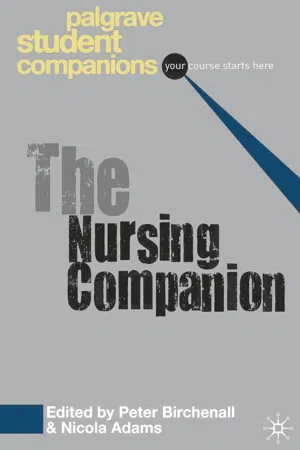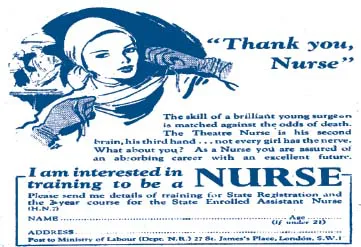![]()
1 studying nursing
1 the context of nursing
2 your nursing course
3 key skills for nursing students
Introduction
This first part of The Nursing Companion explores several important factors to be borne in mind when either deciding whether nursing is for you or beginning your career in nursing. It places you at the beginning of what could become an exciting, challenging and fulfilling occupation. Having a caring personality is a good place to begin your professional journey but because nursing is an intensely person-focused profession, you will meet many situations that call for an array of skills and knowledge that take a lifetime to learn. As a student of nursing, you will discover that dedication, motivation and enthusiasm are the building blocks upon which to construct your career.
To be a successful nurse in the modern age, you will have to become adept at applying theory to practice and the structure of your university-based programme will take you systematically through this demanding process. You will be introduced to terms such as evidence-based practice, which invariably means that an inquiring mind becomes an essential part of your skill base. Learning key skills such as how to combine study with a busy work schedule, how to read for understanding and managing time effectively will stand you in good stead as your career progresses. The whole notion of lifelong learning begins right at the beginning, from day one. In this part of the book, you are encouraged to reflect on your strengths and weaknesses, particularly when it comes to balancing study time with recreational time.
University life offers opportunities for meeting new people, making new friends and engaging in sporting and recreational activities. Being at university will develop your outlook and personality in many ways and knowing yourself becomes important. Identifying when you are at your best for study purposes is a key skill. For example, does your brain work best in the morning or later at night? Are you a solitary person or do you work best as part of a group? As well as developing a structured, orderly way of doing things, you will discover the benefits of learning to problem solve, which may from time to time call upon a certain amount of creativity. With this in mind, you are encouraged to think about the activities set out in Chapters 1–3 and then complete them. Review your thoughts during your reading and learning and in this way you start the early aspects of reflection. By doing this you will begin to recognise the value of reflection. You will discover that this advice applies throughout the book and your career.
![]()
1 the context of nursing
Nancy-Jane Lee
In this chapter we will explore:
Qualities and skills in nursing
Key factors influencing the role of the nurse
Introduction
Among other things The Nursing Companion introduces you to some ‘basic’ nursing principles. However, the ‘basics’ are more than the common sense that many people attribute to nursing. They require expertise and experience, knowledge and skill, confidence and compassion, combined with an understanding of the real health influences in people’s lives. This chapter introduces some of the basic factors underpinning your role as a nurse, which influence the way you learn about, and practise, nursing.
There are activities and student nurse comments (with full permission) throughout the chapter to help you reflect and begin to develop the understanding you need to be a nurse. So why do you want to be a nurse? Hopefully you like learning about people and their lives and want to make a difference for them at profound milestones in their lives. You should love learning, and you need the stamina to combine study with practical placements. You should have the enthusiasm to think and read on your own as well as being able to contribute to the work of a group. All these skills are transferable to a multidisciplinary health and social care setting. In choosing nursing as a career, you should be observant and able to identify and respond to people’s physical and psychosocial needs. Above all, you should recognise the need for dignity and respect in all nursing care and appreciate the times when healthcare ethics and confidentiality are important.
Activity 1.1
What do you think are the qualities of a good nurse? Compare your thoughts with Sarah and Helen who are third year student nurses:
A good nurse is compassionate, can do all skills and, unsure about anything, is aware of their limitations, can build therapeutic relationships with anyone from any background; they must possess good communication skills, and have the motivation and enthusiasm to progress.
In my eyes, a good nurse is someone who can listen to a patient, help them as much as they can. A nurse never gives up on anyone or anything. Although caring is important, they must also be independent in their thoughts.
In what situations might nurses apply the skills that Sarah has identified above? While we are more knowledgeable about how social issues such as housing and education, lifestyle issues such as nutrition and mental health, and economic issues such as employment influence health and wellbeing, complex health problems related to lifestyle and societal stressors persist, especially for the vulnerable. How and where you develop and use your skills as a nurse are influenced by these societal factors.
What do nurses do?
Activity 1.2
What do you expect to do as a nurse? List your expectations and when you have done this, watch one of the contemporary nursing and health dramas on television, observing how nursing is presented. Compare your ideas with those in the media and those that emerge from the advert below.
Figure 1.1 ‘Thank you, Nurse’
Source: Ministry of Labour, 1946
To ask what nurses do is to ask the obvious; people expect nurses to care for the sick and help them get better. Historically, nurses have been considered the doctors’ handmaiden. This is largely due to gender stereotypes and the status of cure and care; these issues will be explored later in the chapter. The advertisement from 1946 illustrates these perceptions while enhancing the life/death excitement of acute nursing; a favourite feature of nursing on the TV. In contrast, demographic changes, lifestyle and social issues, combined with health economics and policy, mean that your role as a nurse is more likely to focus upon community care, health promotion and the management and support for those with long-term conditions. Hospital stays will become shorter, with earlier discharge to care at home, and a focus upon more complex acute and critical care needs within the hospital setting.
Given the shift from hospital-based secondary care to community or primary healthcare, nurses increasingly need the knowledge and skills for community care and understanding of the physical, psychosocial factors influencing health. In addition, earlier discharge from hospital means that community nurses are also dealing with more acute episodes of care in the home. Mental health nursing is also increasingly located in the community, with acute mental health needs being addressed with hospital care. Those patients in hospital are also more acutely ill, requiring increasingly complex knowledge and technical expertise from nursing to manage and deliver care. An increasing feature of nursing work has been that of specialisation. There are, for example, specialist nurses in the areas of palliative care, with Macmillan nurses working in hospitals and the community to provide continuity of care. Other examples of nursing specialisation include those of the breast care nurse, the diabetic nurse and advanced nurse practitioner roles.
Contemporary health policies have meant adaptation to nursing roles in response to changing health needs. For example, the hospital matron was reintroduced to address concerns about hospital hygiene and cleanliness, the increase in methycillin-resistant Staphylococcus aureus (MRSA) and infection rates in hospital. The matron’s remit also covered standards of hospital nutrition. The role was intended to provide focus and leadership, improve communication and standards and reduce complaints about care.
Consultant nurse roles were introduced (DH 1...











